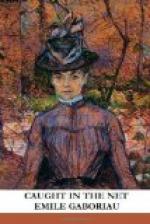On the day after Flavia and Paul Violaine had met at Van Klopen’s, M. Martin Rigal was, at about half-past five, closeted with one of his female clients. She was young, very pretty, and dressed with simple elegance, but the expression of her face was profoundly melancholy. Her eyes were overflowing with tears, which she made vain efforts to restrain.
“If you refuse to renew our bill, sir, we are ruined,” said she. “I could meet it in January. I have sold all my trinkets, and we are existing on credit.”
“Poor little thing!” interrupted the banker.
Her hopes grew under these words of pity.
“And yet,” continued she, “business has never been so brisk. New customers are constantly coming in, and though our profits are small, the returns are rapid.”
As Martin Rigal heard her exposition of the state of affairs, he nodded gravely.
“That is all very well,” said he at last, “but this does not make the security you offer me of any more value. I have more confidence in you.”
“But remember, sir, that we have thirty thousand francs’ worth of stock.”
“That is not what I was alluding to,” and the banker accompanied these words with so meaning a look, that the poor woman blushed scarlet and almost lost her nerve. “Your stock,” said he, “is of no more value in my eyes than the bill you offer me. Suppose, for instance, you were to become bankrupt, the landlord might come down upon everything, for he has great power.”
He broke off abruptly, for Flavia’s maid, as a privileged person, entered the room without knocking.
“Sir,” said she, “my mistress wishes to see you at once.”
The banker got up directly. “I am coming,” said he; then, taking the hand of his client, he led her to the door, repeating: “Do not worry yourself; all the difficulties shall be got through. Come again, and we will talk them over;” and before she could thank him he was half way to his daughter’s apartment. Flavia had summoned her father to show him a new costume which had just been sent home by Van Klopen, and which pleased her greatly. Flavia’s costume was a masterpiece of fashionable bad taste, which makes women look all alike and destroys all appearance of individuality. It was a mass of frills, furbelows, fringes, and flutings of rare hue and form, making a series of wonderful contrasts. Standing in the middle of the room, with every available candle alight, for the day was fading away, she was so dainty and pretty that even the bizarre dress of Van Klopen’s was unable to spoil her appearance. As she turned round, she caught sight of her father in a mirror, panting with the haste he had made in running upstairs.
“What a time you have been!” said she pettishly.
“I was with a client,” returned he apologetically.
“You ought to have got rid of him at once. But never mind that; look at me and tell me plainly what you think of me.”




